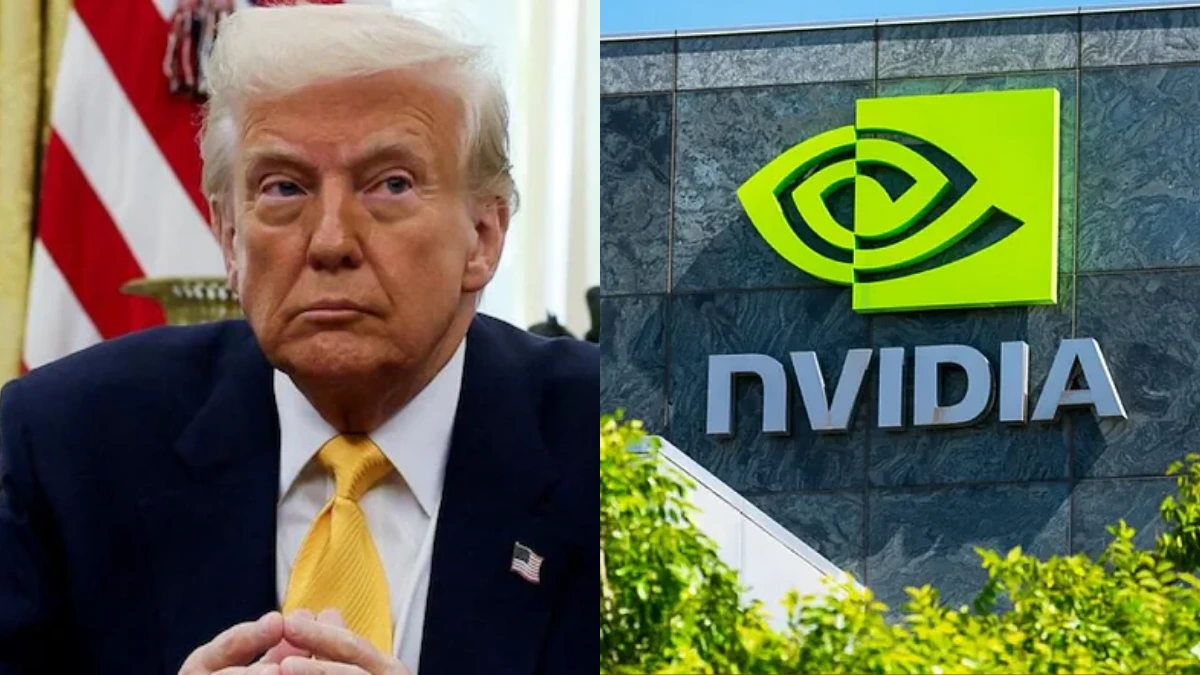
Former US President Donald Trump made the shocking admission that he once considered dismantling Nvidia, the most valuable corporation in the world and a leader in artificial intelligence (AI). Why? to increase competition in the quickly growing market for AI chips. However, after discovering how difficult and extremely disruptive such a move would be, Trump was finally convinced not to pursue the plan.
Trump made this revelation at an AI-related event in Washington, according to a recent Bloomberg report. As he put it bluntly, “I said, ‘Look, we’ll break this guy up,’ before I learnt the facts here.” He was speaking of Nvidia, a major force in the global technology infrastructure due to its explosive growth in market value and hegemony in the production of AI chips.
Nvidia’s Unstoppable Rise

Since training large language models and other sophisticated AI systems requires powerful computing hardware, Nvidia’s influence in the AI space has grown rapidly. Most recently, the corporation became the first company in history to attain a $4 trillion market capitalisation, marking an unforgettable milestone. The GDP of many of the biggest economies in the world is less than this valuation, to put that into perspective.
The company’s flagship GPUs and accelerated computing technologies, which are essential for contemporary AI applications, are partly responsible for Nvidia’s near-monopoly in the AI chip industry, as seen by its astounding market equity.
Trump Media Reveals $2 Billion in Bitcoin Holdings as Part of Bold Crypto Strategy
Why Trump Didn’t Follow Through

According to Trump, he first thought that more companies would be able to compete in the highly competitive AI chip market if Nvidia were to split up. “I thought we could enter and give them a little competition and break them up a little bit,” he remarked. However, he soon found that putting such a strategy into action wasn’t as simple as it seemed.
His advisors cautioned him about the significant logistical and legal challenges associated with taking down a firm such as Nvidia. They said that rivals would still require years, if not decades, to catch up to Nvidia’s infrastructure and degree of innovation even if the business were to split up. Trump abandoned the project as a result of this reality.
European Union Considers Broader Countermeasures as US Trade Talks Stall
Praise for Nvidia’s Leadership

Trump praised Nvidia’s leadership during the Washington event, even though he had initially considered drastic regulatory intervention. He praised the company’s CEO, Jensen Huang, for his accomplishments and vision. Trump praised Huang’s contributions to the development of Nvidia and the larger AI sector, saying, “What a job you’ve done.”
It’s interesting to note that Huang and Trump had previously met. Huang met with White House officials earlier in July to talk about AI and trade policy. The U.S. government allowed Nvidia to start selling its H20 artificial intelligence chips to China again after that meeting. Trump-era trade restrictions that sought to restrict China’s access to cutting-edge U.S. technologies have previously limited these sales.
This change may be a recognition of Nvidia’s vital role in the global digital industry or a potential easing of U.S. trade policy as a result of new AI-focused tactics.
Trump Criticizes Judge in Harvard University Case, Threatens to Slash Billions in Funding
Trump’s AI Action Plan

In addition to his comments regarding Nvidia, Trump utilised the occasion to present his more comprehensive outlook for AI in the United States. The “AI Action Plan” he recently presented consists of a number of executive orders and policy recommendations intended to encourage innovation and lower regulatory obstacles for IT businesses operating in the United States.
The strategy seeks to support local investment and talent development while ensuring that the US maintains its position as a worldwide leader in AI research. Many in the tech industry share Trump’s worry that excessive regulation will impede innovation, emphasising that regulatory red tape shouldn’t impede advancement.
President Donald Trump Urges Washington and Cleveland Sports Teams to Restore Original Names
Nvidia Under Regulatory Scrutiny

Despite the admiration and political support Nvidia has recently enjoyed, the company is not entirely free from scrutiny. Earlier in 2024, the U.S. Department of Justice launched an investigation into Nvidia’s business practices. The probe is reportedly focused on whether Nvidia has engaged in anti-competitive behavior, given its dominant position in the AI hardware market.
Such investigations are part of a broader trend of increased antitrust enforcement against major tech companies, both in the U.S. and abroad. While Nvidia has not been formally charged with any wrongdoing, the ongoing inquiry reflects growing concerns about the concentration of power among a small number of tech giants.
India Urged to Exercise Caution in Trade Talks with US Amid Rising Global Tensions
What This Means for the Future

Trump’s brief dalliance with dismantling Nvidia highlights the enormous power AI firms currently hold in politics, the economy, and international diplomacy in addition to technology. Concerns about technical dependence, national security, and market fairness will continue to be major issues as Nvidia grows its market share.
In the end, Trump’s choice to forego a split illustrates the challenge of getting involved in such a complicated sector as well as the increasing awareness that AI leadership has emerged as a key component of American geopolitical policy. Finding a balance between innovation and regulation in the AI space will continue to be a major concern for years to come, regardless of Trump’s or any other administration’s leadership.
